Vocabulary for Plural Societies/A pluralis tasadalmak szotara, Gabriela Coltescu (coordinator), Polirom, 2005
The political, economic and cultural changes of the last decade in the Central European space induced new words in the vocabulary used in social sciences. Based on researches in multiculturality and interculturality, a group of Romanian, Hungarian and Serbian authors define in the ‘Vocabulary for Plural Societies’ 101 terms from four domains of social sciences (juridical sciences, political theory, sociology and cultural anthropology), highlighting the important changes of the vocabulary in the neighbouring societies who pass through an accommodation process to the specific of the contemporary speech. The goal of this political theory approach is to offer to those interested – students, journalists, politicians – a guide to the new linguistic universe of societies defined through a stressed cultural pluralism.
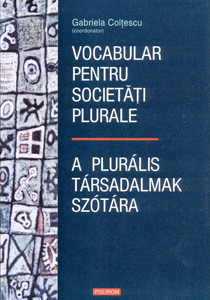
Informative Guide for Citizens
The material was conceived to support citizens in their approach to the local public administration institutions, when trying to find out information, send a request or a complain. It contains data regarding the services and departments of the City Hall of Timisoara, a list of members and Comissions of the Local Council and their contact details, services and departments of Timis County Council, the District Consultative Councils that are functioning in Timisoara, the local non-governmental organisations active in various areas and also the laws that support citizens’ involvement in local authorities’ activities and decision-making process.
The Guide was published within ‘Pro Communitas’ project implemented with the financial support of the European Union.
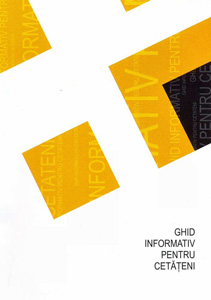
Public Participation in Eastern Europe: Opportunities and Challenges. Study regarding the engagement of non-governmental organisations from Moldova, Romania and Ukraine in the process of implementation of local policies
The study focuses on the issue of public participation, by using a mixt methodology, including legal analysis, documentation, survey and case study. The research offers organisations of the civil society from Moldova, Romania and Ukraine a first comparative evaluation of the third sector from the perspective of its involvement in the public policies making process. The study has a practical purpose, aiming to be a useful tool for professionals from the non-governmental sector and also for the officials from the local administration. The municipalities used as reference were Chisinau - Republic of Moldova, Timisoara - Romania and Izmail - Ukraine.
The material was published within ‘Engaging Civil Society Organisations in Participatory Democracy’ project, with the financial support of Soros Foundation - Romania, Soros Foundation - Moldova and International Renaissance Foundation - Ukraine, through the ‘East East: Partnership Beyond Borders’ program.
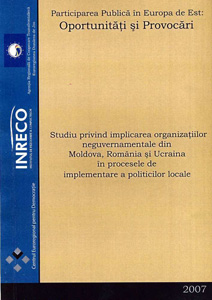
Methodological and Information Material on Social Civil Society Organizations and Their Networks in the European Union
The material was prepared in order to be helpful for NGOs from Bulgaria and Romania that aim at further developing their capacity by establishing links and networking with actors at regional and European level.
‘Part One’ outlines the instruments for participation of Civil Society Organisations in the development of European strategies in the social sphere.
‘Part Two’ deals with policy making in the social field in terms of NGO networks participation, by illustrating successes achieved by European networks of social non-governmental organisations, realized by initiating relevant social debates and/or exerting influence in policy making activities in the social sphere.
‘Part Three’ provides an outline of key EU documents in the social field.
‘Part Four’ and ‘Part Five’ offer a listing with important information on international organisations and EU networks in the social policy sphere.
‘Part Six’ of the MIM offers to the attention of Bulgarian and Romanian NGOs an extensive list with contact details of member organisations of EU networks that might be useful for establishing links and networking.
The MIM was prepared in the framework of the project ‘The Next Mile of the European Civil Society Infrastructure (Boosting the Potential of Bulgarian and Romanian Civil Society Organisation to Improve the Social Environment)’, funded by the European Commission under the Networking Programme – Civil Society Component – Romania and Bulgaria and implemented by the Open Society Institute from Sofia in collaboration with the Euroregional Centre for Democracy – Romania, the European Roma Information Office – Belgium, and the Civil Society Development Foundation – Hungary.
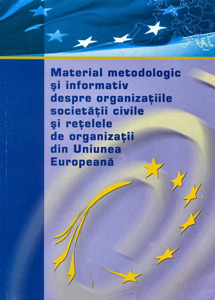
Methodological and Information Material on Social Civil Society Organisations and NGO Networks in Bulgaria and Romania
The material was prepared in order to be helpful for NGOs, European NGO Networks and other institutions from EU Member States who plan and implement initiatives in Bulgaria and Romania and/or collaborate with social non-governmental actors from these two new EU member states.
‘Part One’ outlines the methodology of the research undertaken under the ‘Next Mile’ project, as well as some key observations and findings identified in the course of carrying out the research activities in Bulgaria and Romania.
‘Part Two’ deals with the similarities and differences between Bulgarian and Romanian NGO service providers and elaborates on the question why do such differences, where and if any, exist. It also offers a concise outline of the legal background existing in Bulgaria and Romania for providing social services. It briefly examines the types of social services and possibilities for these services to be delivered by CSOs, and the functions and powers of the coordinating bodies in this area.
‘Part Three’ provides an outline of the research results for Bulgaria and Romania and a model of distinguishing four general types of organisations deriving from these results. This part includes a SWOT analysis and a forecast for each of the types.
‘Part Four’ offers some practical guidelines for CSOs engaged in the provision of social services in Bulgaria and Romania and comments and recommendations addressed to actors from the EU in terms of their approach towards local current and prospective partners in the delivery of social services in Bulgaria and Romania. This part points at some core strategic gaps which have to be bridged in order to engage in an effective and efficient development/implementation of social services for vulnerable groups in Bulgaria and Romania.
‘Part Five’ offers to the attention of prospective EU partners some Case Studies on randomly selected CSOs from both countries, as well as a list including general information about the activities and contact details of some major CSOs and networks in Bulgaria and Romania.
The MIM was prepared in the framework of the project ‘The Next Mile of the European Civil Society Infrastructure (Boosting the Potential of Bulgarian and Romanian Civil Society Organisation to Improve the Social Environment)’, funded by the European Commission under the Networking Programme – Civil Society Component – Romania and Bulgaria and implemented by the Open Society Institute from Sofia in collaboration with the Euroregional Centre for Democracy – Romania, the European Roma Information Office – Belgium, and the Civil Society Development Foundation – Hungary.
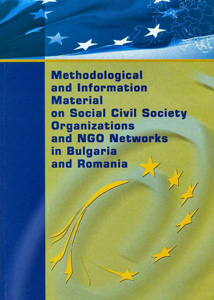
Standards and implementation: National Minorities in Srednjebanatski District and Timis county
The publication contains presentations of lecturers from Srednjebanatski District and Timis county from four educational seminars addressed to representatives of local public authorities, professors from schools that offer education in languages of national minorities, non-governmental organisations activists and journalists from mass-media (minority editorial offices).
Among the themes approached we can mention the international standards in the field of rights protection and liberties of national minorities, the national legislation in this field in Serbia and Romania, the implementation of a minority right (the right to use a minority language officially, the right to education in their own language, the right to political representation) in Srednjebanatski District and Timis county.
The seminars were organized within a project that aimed to improve the capacity to implement national minorities rights in Srednjebanatski District and Timis county. The project was carried out in the first half of 2007 by the Center for Development of Civil Society (CDSC) from Zrenjanin, Serbia and the Euroregional Center for Democracy (CED) from Timisoara, Romania, with the financial support of the European Union, through the European Agency for Reconstruction.
The material is published in Serbian and Romanian languages.
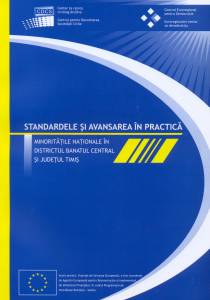
Exchange of Experience in the Field of Social Service Provision. Collection of Good Practises
Between June and October 2007, 29 non-governmental organisations and public institutions, providers of social services, from Bulgaria, Romania and member states of the European Union were involved in a Personnel Exchange System (PES), either as sending or host organisations. The Collection includes impressions and experiences of the 33 members who participated in the study-visits and is based on the report forms they filled in upon returning to their home countries.
PES is part of a larger project that aims at strengthening the role of Bulgarian and Romanian Third Sector in improving social environment, by enhancing the institutional capacity of Civil Society Organizations (CSOs) and stimulation of new forms of co-operation within and among them.
The Collection was published within ‘The Next Mile of the European Civil Society Infrastructure (Boosting the potential of Bulgarian and Romanian Civil Society Organizations to improve the Social Environment)’ project, implemented by the Open Society Institute – Sofia in partnership with the Euroregional Centre for Democracy – Romania, the European Roma Information Office – Brussels, Belgium, and the Civil Society Development Foundation – Hungary, with financial support from the European Commission.
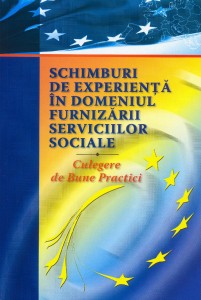
|
